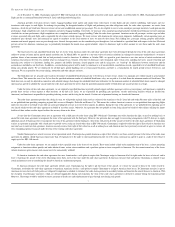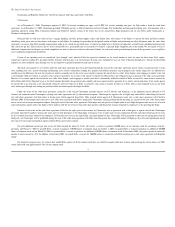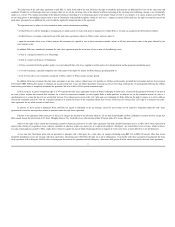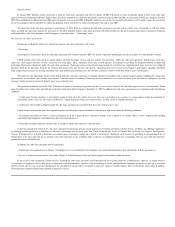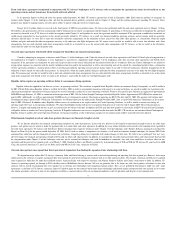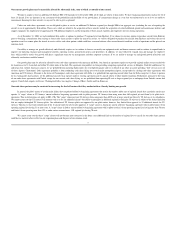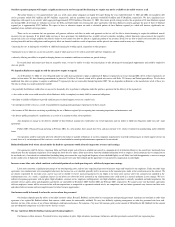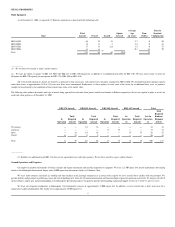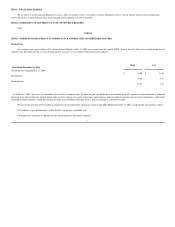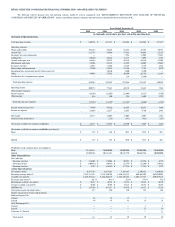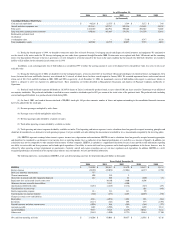Frontier Airlines 2004 Annual Report Download - page 23
Download and view the complete annual report
Please find page 23 of the 2004 Frontier Airlines annual report below. You can navigate through the pages in the report by either clicking on the pages listed below, or by using the keyword search tool below to find specific information within the annual report.
Our fleet expansion program will require a significant increase in our leverage and the financing we require may not be available on favorable terms or at all.
The airline business is very capital intensive and, as a result, many airline companies are highly leveraged. During the years ended December 31, 2003 and 2004, our mandatory debt
service payments totaled $38.3 million and $47.4 million, respectively, and our mandatory lease payments totaled $63.5 million and $71.0 million, respectively. We have significant lease
obligations with respect to our aircraft, which aggregated approximately $793.0 million at December 31, 2004. Our current growth strategy involves the acquisition of 28 more Embraer regional
jets through 2006, all of which we will place in service for Delta and United under our existing code
-
share agreements with them. Embraer's current aggregate list price of these 28 Embraer
regional jets is approximately $752.2 million. We expect to lease or otherwise acquire on credit a substantial portion of these Embraer regional jets, which will increase significantly our
mandatory lease and debt service payments.
There can be no assurance that our operations will generate sufficient cash flow to make such payments or that we will be able to obtain financing to acquire the additional aircraft
necessary for our expansion. If we default under our loan or lease agreements, the lender/lessor has available extensive remedies, including, without limitation, repossession of the respective
aircraft and, in the case of large creditors, the effective ability to exert control over how we allocate a significant portion of our revenues. Even if we are able to timely service our debt, the size of
our long
-
term debt and lease obligations could negatively affect our financial condition, results of operations and the price of our common stock in many ways, including:
•
increasing the cost, or limiting the availability of, additional financing for working capital, acquisitions or other purposes;
•
limiting the ways in which we can use our cash flow, much of which may have to be used to satisfy debt and lease obligations; and
•
adversely affecting our ability to respond to changing business or economic conditions or continue our growth strategy.
If we need funds and cannot raise them on acceptable terms, we may be unable to realize our current plans or take advantage of unanticipated opportunities and could be required to
slow our growth.
We depend on Embraer to supply us with the aircraft we require to expand.
As of December 31, 2004, we were obligated under our code
-
share agreements to place an additional 28 Embraer regional jets in service through 2006. All 28 of these regional jets are
subject to firm orders. We have financing commitments in place for 24 of these 28 aircraft, which will be placed into service with Delta, US Airways and United upon delivery. We also have
conditional firm orders or options to acquire an additional 95 regional jets that are exercisable through September 2007. We are dependent on Embraer as the manufacturer of all of these jets.
Our risks in relying on a single manufacturer include:
•
the possibility that Embraer could refuse, or may not be financially able, to perform its obligations under the purchase agreement for the delivery of the regional jets;
•
a fire, strike or other event could occur that affects Embraer's ability to completely or timely fulfill its contractual obligations;
•
the failure or inability of Embraer to provide sufficient parts or related support services on a timely basis;
•
the interruption of fleet service as a result of unscheduled or unanticipated maintenance requirements for these aircraft;
•
the issuance of FAA directives restricting or prohibiting the use of Embraer regional jets or requiring time
-
consuming inspections and maintenance; and
•
the adverse public perception of a manufacturer as a result of an accident or other adverse publicity.
Any disruption or change in the delivery schedule of these Embraer regional jets would affect our overall operations and our ability to fulfill our obligations under our code
-
share
agreements.
Further, ERJ
-
170 aircraft began operating in February 2004. As a new product, these aircraft have been, and may continue to be, subject to unforeseen manufacturing and/or reliability
issues.
Our operations could be materially adversely affected by the failure or inability of Embraer or any key component manufacturers to provide sufficient parts or related support services on
a timely basis or by an interruption of fleet service as a result of unscheduled or unanticipated maintenance requirements for our aircraft.
Reduced utilization levels of our aircraft under the fixed
-
fee agreements would adversely impact our revenues and earnings.
Our agreements with US Airways, American, Delta and United require each of them to schedule our aircraft to a minimum level of utilization. However, the aircraft have historically been
utilized more than the minimum requirement. Even though the fixed
-
fee rates adjust, either up or down, based on scheduled utilization levels or require a fixed amount per day to compensate us
for our fixed costs, if our aircraft are underutilized (including taking into account the stage length and frequency of our scheduled flights) we will likely lose both the opportunity to recover a margin
on the variable costs of flights that would have been flown if our aircraft were more fully utilized and the opportunity to earn incentive compensation on such flights.
Increases in our labor costs, which constitute a substantial portion of our total operating costs, will directly impact our earnings.
Labor costs constitute a significant percentage of our total operating costs, and we have experienced pressure to increase wages and benefits for our employees. Under our code
-
share
agreements, our reimbursement rates contemplate labor costs that increase on a set schedule generally tied to an increase in the consumer price index or the actual increase in the contract. We
are entirely responsible for our labor costs, and we may not be entitled to receive increased payments for our flights if our labor costs increase above the assumed costs included in the
reimbursement rates. As a result, a significant increase in our labor costs above the levels assumed in our reimbursement rates could result in a material reduction in our earnings. We have
collective bargaining agreements with our pilots, flight attendants, customer service employees and dispatchers; our flight attendants agreement is currently amendable and under negotiation. Our
customer service agents, pilots and dispatchers agreements are amendable in December 2005, October 2007 and February 2007, respectively. We cannot assure you that future agreements
with our employees' unions will be on terms in line with our expectations or comparable to agreements entered into by our competitors, and any future agreements may increase our labor costs
and reduce both our income and our competitiveness for future business opportunities.
Our business could be harmed if we lose the services of our key personnel.
Our business depends upon the efforts of our chief executive officer, Bryan K. Bedford, and our other key management and operating personnel. American can terminate its code
-
share
agreement if we replace Mr. Bedford without their consent, which cannot be unreasonably withheld. We may have difficulty replacing management or other key personnel who leave and,
therefore, the loss of the services of any of these individuals could harm our business. We maintain a "key man" life insurance policy in the amount of $10 million for Mr. Bedford, but this amount
may not adequately compensate us in the event we lose his services.
We may experience difficulty finding, training and retaining employees.
Our business is labor
-
intensive. We intend to hire a large number of pilots, flight attendants, maintenance technicians and other personnel associated with our expansion plans.


